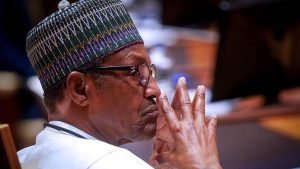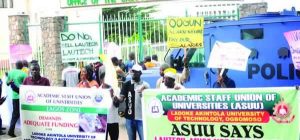
Insecurity is violence that stems from infrastructural and social inequalities and inequities that births an outburst of countercultural discourses borne of protests within the nation. The oppressive silences that have reached suicidal levels cannot be ignored. The pockets of uncoordinated aspirations and the constant expression of a problematic constitution may have also contributed to structural violence that has led to uprising amongst ethnicities and interests who feel that the best way to gain the attention of the Nigerian government is to deploy guerilla warfare against the resources of the state or against the peace of the state. These are the unmistakable precursors of insecurity: dissatisfaction, oppression, absence of rule of law, misgovernance, among others.
Most profound is Professor Mark Nwagwu’s analysis of the state of Nigeria from the perspective of the cells in the human body. The metaphor expresses that Nigeria is an infected body struggling to stay alive, a body that disagrees with how it intends to fight micro bacterial or viral insurgents cannot stand, and cannot live. It will take the concerted efforts of the executive, the legislature, the judiciary and the Nigerian people to begin to contribute to the wealth and well-being of the country instead of sabotaging it with corrupt practices, ethnic hatred and religious malapropism that induce genocide. The principle of co-habitation and mutual respect must be embraced by all. Justice is an important discourse for nation-building and the large displacement of justice has led many to take laws into their own hands. Pockets of injustices coupled with the large absence of reconciliation will only make manageable quarrels evolve into grave social conditions.
There is also no doubt that leadership, the actions and inactions of leaders have a way of sending the wrong or right signals to aggrieved parties. In Kaduna, allegation between the people of the community on the one hand, and cattle rustlers and land grabbers on the other hand may never end. While the Nigerian government has deployed a military operation to the scene, it is also important that the governor show good faith in managing communication so as not to be seen as biased or a sponsor of one against the other. Kaduna is imploding because of climate concerns, native pride, and many other political and governance issues.
The culture of distrust rages on in Nigeria—from the expansionist business of bribes and extortion entrenched by a chain of bad eggs within the Nigeria Police to the sensationalism of the media who are eager to break the news even if the news is bound to break the country into two halves. Distrust is fueled by misinformation on one hand, and the truth that the Nigerian state is going through a phase.
While the Buhari administration is trying to purge and destroy the culture of misgovernance, the virus of corruption fights back by subverting best and ethical practices in all spheres of Nigerian life. Therefore, distrust stems from the fact that the average Nigerian is suspicious of not only the government, but of his fellow Nigerian. Nigerians have gone through many years of tyranny with short sprouts of problematic democratic rule. They experience post-traumatic stress on a daily basis. The media has helped to aggravate this post-traumatic stress by bolstering unverified news and articles to the consciousness of powerless Nigerians who continue to distrust their government and its policies.
Some Nigerians believe that the war against insurgency is a business venture being sponsored by government. It is important to note that the war against Boko Haram is not a Shakespearean tragicomedy or an Animal Farm, it is about human lives, the sovereignty of a nation, the peace of a nation, the viability of a nation to attract investors and trade. It is about developing a viable economy for where the human and natural resources of a country can be fully harnessed for the good of all. No government worth its salt will sponsor terror within its territory and stretch itself to support IDP camps instead of widening the pool of efficient tax payers. No military worth its salt will delight in using landmines and grenades to destroy the landmines of its own men and officers. We should be weary of wild tales.
While we expect the military to do more to push back the Boko Haram,we are also curious that the Nigerian Army has not received ample support from the United Nations and our supposedly traditional western allies. In the time of peace in Nigeria, the UN enjoyed the support of the Nigerian army in executing peace operations in Africa, Middle East and in Europe, in fact in 26 countries. What has happened to the values of loyalty and reciprocity from the UN and its allied forces? Meanwhile Nigeria continues to face threats not only from Boko Haram but also from the Islamic State of West Africa, ISWA, an organization that derives its terror ample support from international terror groups, the Islamic State. Given the fact that the terror networks in the Sahel has been boldened by international terror agencies as well as the porous inter-national borders, the transference of firepower and technical know-how to the terror groups seems more favourable than with Nigeria.
The Buhari government, through Alhaji Lai Mohammed, the information minister recently expressed frustration that Nigeria has not received weapons she has paid for from Western powers and other world powers have refused to sell weapons to Nigeria. Does the rest of the world have any idea that Nigeria is too big and too populated to implode into smithereens where its citizens begin to choke its neighbours as refugees? Is it a welcome agenda of these world powers to have Nigeria divide into bits and pieces that will serve their neo-colonial ideas? These are questions left unanswered.
Nigerians must therefore reach a threshold where it must look after itself, protect and defend all citizens, rehabilitate all Nigerians through the use of good governance and media retooling policies. It must drive a patriotism based on the equality and justice for all. The government has a lot of work to do in this regard, but the citizens also have to come to terms with the evolving Nigeria.
Suleiman Galadima

